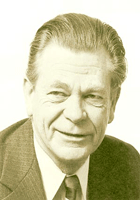James Phillip McAuley
James Phillip McAuley Poems
The magpie's mood is never surly
every morning, wakening early,
he gargles music in his throat,
...
A ray of light, to an oblique observer,
Remains invisible in pure dry air;
But shone into a turbid element
It throws distracting side-gleams everywhere
...
Spring stars glitter in the freezing sky,
Trees on watch are armoured with frost.
In the dark tarn of a mirror a face appears.
...
I had often, cowled in the slumbrous heavy air,
Closed my inanimate lids to find it real,
As I knew it would be, the colourful spires
...
My father and my mother never quarrelled.
They were united in a kind of love
As daily as the Sydney Morning Herald,
Rather than like the eagle or the dove.
...
A year ago you came
Early into the light.
You lived a day and night,
Then died; no one to blame.
...
That each thing is a word
Requiring us to speak it;
From the ant to the quasar,
From clouds to ocean floor-
...
Not how you would be thought of, your color
Being grey, silky, like a second skin, your hair
Flecked with it. Now, hearing your way of saying
Iridescent while I read your poem, three years
...
A sky contused and rifted like a wound:
Red-amber gum exudes from the dark tree;
A long day’s dying. Small anatomy
Locked in this nameless grave’s neglected mound,
...
This morning, friends, the blackboard will be black
Behind my skull: your eyelids will be slack,
And I could wearily cajole from you, or you,
Slow answers to dull questions; or grow annoyed
...
On the street of the concrete refugee tenements
That have collapsed into the smoking holes
The Israeli rockets blew open at dawn’s early light,
The sundered limbs and torsos of a Jenin family
...
James Phillip McAuley Biography
James Phillip McAuley was an Australian academic, poet, journalist, literary critic and a prominent convert to Roman Catholicism. Life and career McAuley was born in Lakemba, a suburb of Sydney. He was educated at Fort Street High School and then attended Sydney University where he majored in English, Latin and philosophy. In 1937 he edited Hermes, the annual literary journal of the University of Sydney Union, in which many of his early poems were published until 1941. He began his life as an Anglican and was sometime organist and choirmaster at Holy Trinity Church, Dulwich Hill in Sydney. McAuley lost his Christian faith as a younger man. In 1943 McAuley was commissioned as a lieutenant in the militia for the Australian Army, and served in Melbourne (DORCA) and Canberra. After the war he also spent time in New Guinea, which he regarded as his second "spiritual home". McAuley came to prominence in the wake of the 1945 Ern Malley hoax. With fellow poet, Harold Stewart, McAuley concocted sixteen nonsense poems in a pseudo-experimental modernist style. These were then sent to the young editor of the literary magazine Angry Penguins, Max Harris. The poems were raced to publication by Harris and Australia's most celebrated literary hoax was set in motion. In 1952 he converted to Roman Catholicism, the faith his own father had abandoned. This was in the parish of St Charles at Ryde. He was later introduced to Australian musician Richard Connolly by a priest, Ted Kennedy, at the Holy Spirit parish at North Ryde and the two subsequently collaborated to produce between them the most significant collection of Australian Catholic hymnody to date, titled "Hymns for the Year of Grace". Connolly was McAuley's sponsor for his confirmation into the Roman Catholic Church. In his undergraduate years McAuley was influenced by both communism and anarchism, but although a man of the left, McAuley remained staunchly anti-communist throughout his later life. In 1956 he and Richard Krygier founded the literary and cultural journal, Quadrant and was chief editor until 1963. From 1961 he was professor of English at the University of Tasmania. A portrait of McAuley by Jack Carington Smith won the 1963 Archibald prize. James McAuley died of cancer in 1976, at the age of 59, in Hobart.)
The Best Poem Of James Phillip McAuley
Magpie
The magpie's mood is never surly
every morning, wakening early,
he gargles music in his throat,
the liquid squabble of his throat.
Its silver stridencies of sound,
the bright confusions and the round
bell-cadences are pealed
over the frosty, half-ploughed field.
Then swooping down self confidently
from the fence-post or the tree,
he swaggers in pied feather coat,
and slips the fat worms down his throat.
